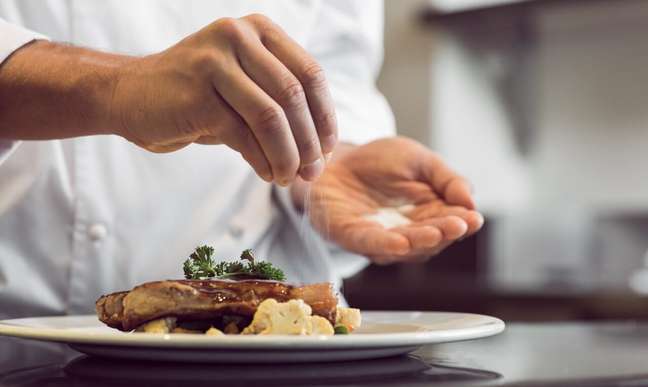The study showed that the frequent habit of adding salt to food at the table could carry a 28% higher risk of premature death.

The food is seasoned during preparation, but during the meal it is customary to add a few more pinches of salt to the plate. It may seem harmless, but it increases your chances of getting hit by up to 28%. premature death. This is what a study on more than 500,000 people, published in the European Heart Journal shows.
“In the general population, about three in percent people between the ages of 40 and 69 die prematurely. The risk observed in the study suggests that one in a hundred more people may die prematurely in this age group,” explains nephrologist Dr. Caroline Reigada, specialist in Intensive Medicine, of the Brazilian Association of Intensive Medicine, and in Internal Medicine / Medicine.
This is because salt is the main cause of high pressure, as it causes the arterioles to shrink. Long-standing hypertension damages the kidneys and their various vessels, that is, damage occurs to target organs, such as in the heart and brain. Additionally, salt promotes fluid retention in the body. “Recent data shows that sodium also modulates the functioning of immune cells, supporting the theory of increased inflammation in the body,” adds the expert.
The World Health Organization (WHO) recommends that salt intake does not exceed 5 grams per day or 2 grams of sodium. However, Brazilians consume almost twice as much: on average 9.34 grams, according to the Oswaldo Cruz Foundation (Fiocruz). “Excessive consumption is a health hazard, as salt is linked to an increased risk of chronic and silent diseases. Examples are hypertension, cardiovascular and kidney diseases, among others, which can evolve with an increased risk of early death “, explains Dr. Marcella Garcez, director and professor at the Brazilian Association of Nutrology (ABRAN) .
I study
The survey found a shorter life expectancy among people who have always added salt versus those who have never or rarely added salt to ready-to-eat foods. “At the age of 50, 1.5 and 2.28 years were reduced by the life expectancy of women and men respectively,” says Dr. Carolina.
According to the study, adding salt to food at the table is a common eating behavior. It is directly related to an individual’s long-term preference for salty tasting foods and habitual salt intake. “In the Western diet, the addition of table salt represents 6-20% of the total sodium intake. This provides a unique way to assess the association between habitual sodium intake and the risk of death,” he says. the document.
The researchers analyzed data from 501,379 people who participated in the British biobank study. When they entered the study between 2006 and 2010, participants were asked, via a touchscreen questionnaire, whether they added salt to foods (i) never / rarely, (ii) sometimes, (iii) usually, (iv) ) always or (v) prefer not to answer. Those who preferred not to answer were not included in the analysis.
The team of scientists adapted their analyzes to take into account factors that could influence the results. Such as age, gender, race, sleep deprivation, body mass index (BMI), smoking, alcohol intake, physical activity, diet, and medical conditions such as diabetes, cancer, and diseases of the heart and blood vessels. They followed the participants for an average of nine years. Premature death was defined as death before age 75.
In addition to discovering the impact on life expectancy, the researchers found that these risks were slightly reduced in people who consumed the highest amounts of fruits and vegetables. However, these results were not statistically significant. “Fruits and vegetables are the main sources of potassium, which have protective effects and are associated with a lower risk of premature death,” explains Dr. Carolina.
How to reduce the consumption of salt
“Assessing overall sodium intake is notoriously difficult, as many foods, especially prepared and processed ones, have high levels of salt added before they even reach the table. If excessive, with the risk that their chronic consumption will damage some organs “, explains Dr. Carolina.
He claims that, in addition to reducing the extra salt added after preparations, the ideal is prepare your own meals, as it is possible to reduce the amount of sodium. “We will never be able to control the amount of salt added to a meal purchased at the restaurant, fast-food and delivery. At home, during the preparation phase, a suggestion is to prefer natural condiments to flavor the food, such as garlic, onions, parsley , chives, coriander, lemon or others of your choice “, highlights.
“We should also avoid all highly processed, sodium-rich foods. Likewise, we should satisfy the sweet taste to reduce excess sugar, adding spices and seasonings will give flavor without excess salt. We are aware that social salt reduction strategies will reduce the average blood pressure levels of the population, resulting in fewer people developing hypertension and its consequences, remembering that hypertension is the number one cause of kidney failure. “, concludes the doctor.
+The best content in your email for free. Choose your favorite Earth Newsletter. Click here!
Source: Terra
Benjamin Smith is a fashion journalist and author at Gossipify, known for his coverage of the latest fashion trends and industry insights. He writes about clothing, shoes, accessories, and runway shows, providing in-depth analysis and unique perspectives. He’s respected for his ability to spot emerging designers and trends, and for providing practical fashion advice to readers.







